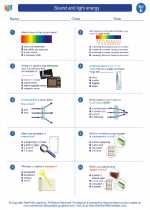Sound and light energy -> universal solvent
Universal Solvent
The term "universal solvent" refers to a substance that has the ability to dissolve a wide range of different solutes. Water is often referred to as the universal solvent because of its unique chemical properties that allow it to dissolve a variety of substances. This property makes water essential for many biological and chemical processes.
Properties of Water as a Universal Solvent
Water's ability to act as a universal solvent is due to its polar nature. The water molecule (H2O) is made up of two hydrogen atoms and one oxygen atom. The oxygen atom has a slightly negative charge, while the hydrogen atoms have a slightly positive charge. This polarity allows water molecules to attract and surround charged or polar molecules, causing them to dissolve.
Additionally, water's high dielectric constant further enhances its ability to dissolve ionic compounds and polar molecules. This means that water can easily break apart ionic compounds into their individual ions, allowing them to be surrounded and dispersed in the water.
Examples of Universal Solvents
In addition to water, other substances can also act as universal solvents under specific conditions. Some examples include:
- Ammonia: Ammonia is capable of dissolving a wide range of substances due to its ability to form hydrogen bonds and its polar nature.
- Acetone: Acetone is a powerful solvent that can dissolve both polar and nonpolar substances, making it useful in various industrial applications.
- Alcohol: Ethanol and other alcohols have the ability to dissolve a variety of compounds, making them useful as solvents in the production of medicines, perfumes, and cleaning products.
Study Guide
- What is a universal solvent?
- What are the properties of water that make it a universal solvent?
- Can substances other than water act as universal solvents? Provide examples.
A universal solvent is a substance that has the ability to dissolve a wide range of different solutes.
Water's polar nature, high dielectric constant, and ability to form hydrogen bonds contribute to its role as a universal solvent.
Yes, substances like ammonia, acetone, and alcohol can also act as universal solvents under specific conditions.
Understanding the concept of universal solvents is essential for comprehending the role of solvents in various chemical and biological processes. It also provides insights into the unique properties of water and other solvents that make them valuable in practical applications.
.◂Science Worksheets and Study Guides Fifth Grade. Sound and light energy

 Activity Lesson
Activity Lesson
 Worksheet/Answer key
Worksheet/Answer key
 Worksheet/Answer key
Worksheet/Answer key
 Worksheet/Answer key
Worksheet/Answer key
 Worksheet/Answer key
Worksheet/Answer key
 Vocabulary/Answer key
Vocabulary/Answer key
 Vocabulary/Answer key
Vocabulary/Answer key
